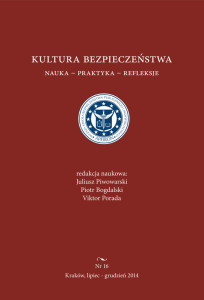POCZĄTKI PRAWA I FILOZOFII BEZPIECZEŃSTWA CESARSTWA JAPONII
POCZĄTKI PRAWA I FILOZOFII BEZPIECZEŃSTWA CESARSTWA JAPONII
Author(s): Andrzej Czop, Marek SokołowskiSubject(s): Security and defense
Published by: Wyższa Szkoła Bezpieczeństwa Publicznego i Indywidualnego “Apeiron” w Krakowie
Keywords: morality;law;security;public service;
Summary/Abstract: The author of this article hope to show the essential meaning of the Japanese perspective on law, order and security. Since the 1950s in the USA and European countries we have been witnessing the global expansion and popularity of Budō (Far- Eastern martial arts). Those martial arts positively influence the improvement of security culture. The authors want to show that it is worthwhile to study the achievements of Japanese culture, not only because of their different characteristics, but mainly because they emphasize honor and tradition, which are the specificities of uniformed and public services. The purpose of the creation of “The Seventeen-Article Constitution” was the implementation of ethical principles, which would ensure the security of the state and its residents. This document was based not only on Buddhism, already firmly rooted in Japan, but also on Confucianism. In this work we read that “the Constitution” included the principle stating that each person is part of a particular group, and should live in harmony with other members. Thus, it means to show respect toward all people and to rid oneself of negative thoughts, emotions and actions. “The Seventeen-Article Constitution” also includes the foundations of central management. Moreover, it is considered to be the initial Constitution of Japan.
Journal: Kultura Bezpieczeństwa. Nauka-Praktyka-Refleksje
- Issue Year: 2012
- Issue No: 11
- Page Range: 14-18
- Page Count: 5
- Language: Polish

